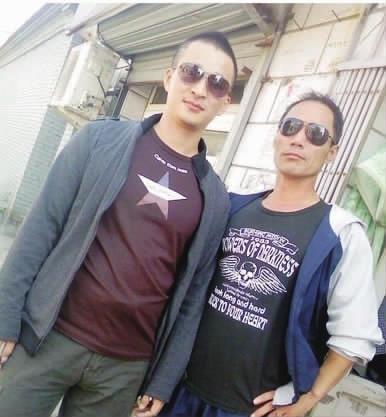Farmer-turned Internet singers rock Shanghai
 |
| Farmer-turned Internet celebrities Wang Xu (R) and Liu Gang. |
Street singers
To support his wife and two sons, Wang came to Beijing in 2000 and has worked as boiler man, and street peddler, before becoming a medical warehouse keeper, with a monthly pay of around 1,500 yuan ( 227 U.S. dollars). Little is left after he pays 600 yuan for rent and buys food.
In September 2003, Wang started busking downtown Beijing's pedestrian underpasses at weekends or evenings.
"I love music, and also want to earn some money to meet my daily needs," Wang told Xinhua.
Liu came to Beijing in 2002, two years after he ended military service. "I wanted to try my luck in the big city," he said.
He had worked as a guard, roadside peddler, and porter, but never had a stable job. Busking was his main income, even after he married and become a father three years ago.
"I can get 30 to 80 yuan normally an evening, and more than 100 at my best," Liu said. "But it may take days to recover if I develop a sore throat after to hours of singing."
He recalls tougher times when he had to sell his aluminum pan for 2 yuan, to buy four mantou, or Chinese steamed buns, to eat.
A better life
Wang and Liu are still uncertain where their fame will lead. Wang has started learning to use a computer. They even have a microblog account to communicate with fans.
"We are happy and proud that so many people think the music video represents heartfelt expression of migrant workers and the underclass," Wang said.
Wang and Liu want to continue singing, but underpasses are now out of the questions as the crowds they draw are too big.
Wang appealed to the public to be more understanding of migrant workers.
"Please don't look down upon migrant workers, who may be less educated, but are kindhearted," Wang said.
The migrant workers built the city's gleaming towers, but they might never be allowed into the buildings, Wang said. "The guards possibly won't let a farmer-looking guy enter the beautiful buildings."
Zhang Yiwu, a professor at Chinese language department of Peking University, said new media and the Internet had provided grassroots groups with a channel to speak out.
Besides the material needs of the vulnerable groups including the migrant workers, "their cultural needs also should come to our attention," Zhang said.
Government figures indicate the number of China's migrant workers stood at 150 million in 2009. They usually take tiring but low-paid jobs due to their lack of education and skills, and send money back to their families in underdeveloped rural areas.
 0
0 







Go to Forum >>0 Comments